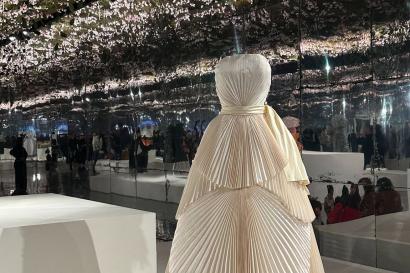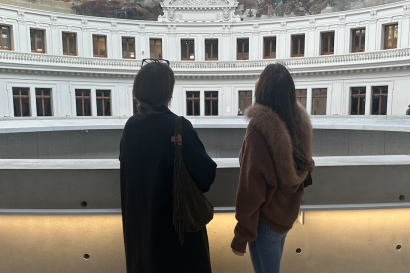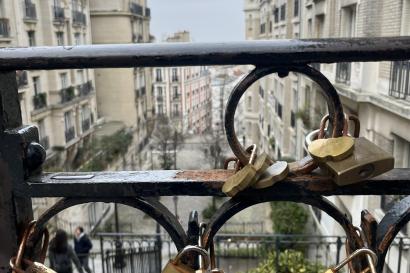I was at Disneyland Paris with my friends getting food. We had to place our order at the register and go to a separate station to pick it up. The cook was preparing my food and when they were done, they held my plate, smiled, and asked where I was from. I said, “I’m from New York.” They smiled again and said, “No, but where are you really from?” This took me back to the end of my last semester abroad in France…
I was sitting on a bench eating a kebab with my white American friend. Two people approached us and asked where we were from. We both said at the same time that we were from the U.S. to keep the conversation short. They both laughed and one said, “Yes, you are American,” looking at my friend, and then turned to point at me. “You, where are you from? You are not American. You have a different skin color, your eyes are different, and you have curly hair. Where are you REALLY from?” In this moment, I didn’t know what to say because I had never been questioned this way about my race or ethnicity based on the way I looked. My friend, offended for me and noticing that I was speechless, took over and said, “She told you she’s from the U.S., we’re from New York.” I had been asked about my race and ethnicity before, and I could talk for days about my identity and culture, but I had never been asked in such a direct way. I was mostly shocked that they didn’t accept I was American because of the way I look.
So, remembering this encounter, realizing that the cook is curious because I look different, and more aware about how to deal with situations like these, I answered with another question. I asked, “What do you mean?” They rephrased the question and said, “Your place of origin…where are you from? Are you from Mexico?” I laughed to myself because they assumed this based on my physical features and possibly, the popularity of the country. I smiled and answered, “No, I’m Guatemalan and Honduran.” They set my plate down, surprised, and said, “Wow, but I knew you were from those parts. Have a great day!” I thanked them and walked away, still trying to analyze the situation.
On a separate occasion, I went to get sushi with a friend around my current neighborhood in Paris. As we were waiting for our food, the person at the register starts to make conversation by asking me if I’m in Paris for tourism. I told them about our study abroad program and this turned into another “Where are you REALLY from?” situation. When I explained, they said, “You know, there aren’t many of you here,” referring to Latin American people. I laughed, now understanding more of why people kept asking me the same thing.
I had another similar encounter as I was leaving the Metro station. While I was waiting for the light to change, a person approached me and asked, “Are you from Peru?” It was very random and honestly felt a bit weird, so I simply said, “No.” They continued, “Are you from Mexico?” I said, “No.” They persisted, “Are you Asian?” I replied no, surprised by how creative they were getting. As the light changed, they asked, “I don’t know, where are you from?” I appreciated that they finally realized they didn’t know and should stop making assumptions so, I told them. They answered, “Oh, I was just wondering because my best friend just married someone from Peru, and you have similar features.”
I do not consider these negative encounters. I believe that in each case, all parties learned from these interactions. Personally, this has helped me realize that people here are extremely direct. At orientation, when we talked about diversity this was mentioned. However, I didn’t think this would happen so often, or even at all! I thought what had happened in 2015 was a one-time thing, but I was wrong. Here, people are not afraid to start an interaction with a personal question, and this is so different to the way things work back home. I debriefed with my roommate who is our Residential Adviser and has lived here for two years. They confirmed that this was normal for the French, especially here in Paris. If people are curious about you, they will not think twice to approach you. I also learned that there isn’t a large Latinx population in Paris, so I set a goal to find at least one Latinx community, which will be beneficial for me since I was feeling homesick this past week. As for the people who approached me, I believe that they became more aware of the way they phrased their questions and learned that they should second guess, and not necessarily voice, their assumptions.
I have continued to get questions like these, and even looks, when I go shopping or simply walk in the street. For me, this has not been so difficult to do because I am comfortable with being uncomfortable, and I am confident about my identity. Living here for the summer, actively trying to understand this culture and its people, has also taught me to not take offense when this happens because these actions come from curiosity. My physical features have not only helped me learn about the French in a weird way. People also never assume I’m from the U.S., so no one ever speaks to me in English, which has allowed me to practice more French!

Ana Castellanos
Growing up in a diverse and creative environment like New York City, I became interested in music, drawing, reading, and creative writing. My large family was extremely supportive of my hobbies and encouraged me to enter competitions for storytelling, performing arts, and art expos. I learned a lot about myself and learned to share my hobbies with my family throughout this process.









